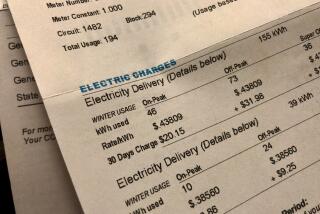Choosing a Phone Is the Easy Part
- Share via
The cell phone may be at the heart of debates about safe driving habits, the health risks of radio wave emissions and proper etiquette in public places, but it remains the hottest-selling consumer electronics device--especially during the holidays.
Eager to encourage the trend, wireless carriers respond with a barrage of sales and special promotions. Many of them are good deals, but it’s important to guard against getting carried away in the process.
In most cases, a cell phone service plan is a long-term commitment, lasting one or two years. It comes with a contract that outlines the plan’s monthly fee, the amount of air time included in the plan each month and the price you’ll pay for extra minutes, directory assistance, messaging, Internet connections, long distance, out-of-town use and other features.
The primary carriers in California include AT&T; Wireless, Cingular Wireless, Nextel Communications, Sprint PCS and Verizon Wireless. Other wireless providers also sell service under their own brand name, even though the calls will be routed over a network owned by one of the licensed carriers.
Service coverage and quality can vary by carrier and location, and it makes the difference between being able to use your phone and not. Unfortunately, the carriers provide coverage maps that are too general to be of much use.
To help find out which company is best for you, collect the opinions of everyone you know who has a cell phone, especially people who work or live near you or who have travel patterns that resemble your own.
Keep in mind that radio signals can be great on one block and lousy on the next and that carriers with terrible service in one city might have exceptional service in another.
Finding the right plan is not easy either, but it’s essential to make some comparisons before you buy so you don’t get locked into unnecessarily high charges for a year or more.
Several Internet sites ease the pain by walking you through a few basic questions about your location, preferences and planned usage and then listing service plans with the best fit.
Sites run by the carriers themselves obviously select from their own lineup of plans, but independent sites run by Let’s Talk, Cellmania and others will give shoppers advice and recommend plans after comparing the offerings of several companies.
Each service provider also has a network of its own stores, but you also can buy phones and service through specialty wireless shops, electronics and office supply stores and a variety of department stores, Costco, Wal-Mart and others.
Before buying, first consider how the phone will be used. The answer will help you estimate the number of minutes you are likely to use each month.
A so-called “safety user” wants a phone handy mainly for emergencies. In that case, the best choice is a bare-bones service plan with the lowest monthly fee available--typically $20 to $30.
An average user makes both personal and business calls and uses the phone during the week as well as on weekends, with a few long-distance calls mixed in. Those users usually can get by with a plan that includes 150 to 180 minutes each month (about two or three calls a day).
Many others, including college students, can easily use 300 minutes or more every month. Heavy-duty mobile phone users typically travel a lot and use up a substantial number of minutes--1,500 or more--on a monthly basis.
Now that messaging is starting to take off, you’ll want to review the costs associated with that service, including the per-character or per-message charges and whether the service comes with an extra monthly charge.
Buying a plan with too many minutes or too few minutes can be a costly mistake, so it’s important to find a carrier that will let you switch plans without charging an extra fee and without extending your contract.
You’ll also need to keep a keen eye on the type of minutes that come with your plan. Some plans will load you up with as many as 3,000 weekend minutes, most of which will go to waste unless you spend hours on the phone on Saturdays and Sundays.
Check to see whether your plan provides “any time” minutes or charges extra for calls made during the week and during business hours (peak time).
Two alternative service plans are worth considering: Family plans and prepaid plans. Family plans vary by carrier, but the basic concept is that a customer can buy phones for several family members and have one pool of minutes shared among the users. Some plans waive the charge for mobile-to-mobile calls between family members--a potentially big savings.
The downside to the shared-minutes concept is that an exceptionally talkative family member can use up more than his or her share of the allotment, potentially costing the family big bucks for the overage.
Prepaid plans allow users to buy a phone with a specific allotment of minutes in one package. When the allotment is used up, the service is cut off unless the customer buys more minutes. There are no monthly fees, credit checks or worries about getting an unexpectedly large bill at the end of the month.
The catch is that prepaid service typically comes with a substantially higher cost for each minute of use. In addition, users can get repeatedly charged an activation fee each time they stop and then restart service.
In all cases, read the fine print. That’s where you’ll find details about cancellation fees and penalties, refund policies and other unadvertised items.
*
Elizabeth Douglass covers telecommunications. She can be reached at elizabeth.douglass@latimes.com.






